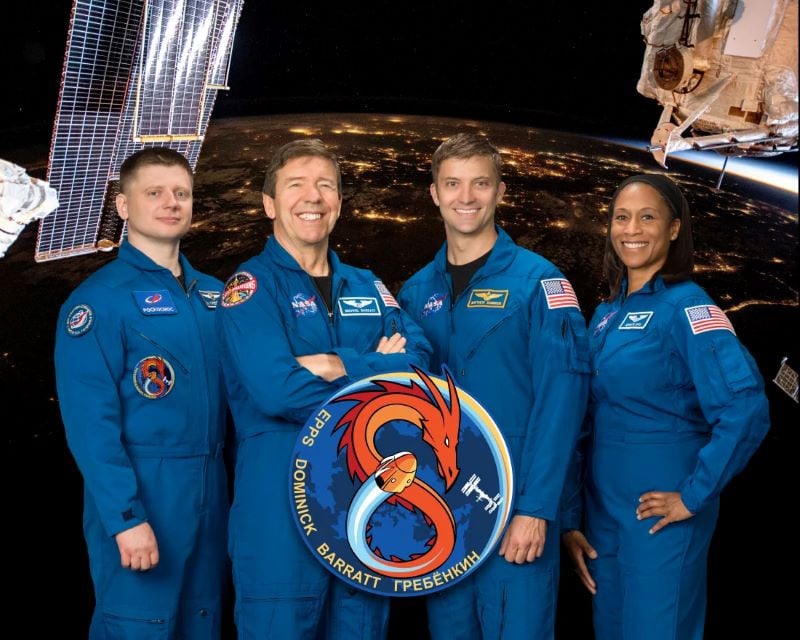
NASA's Crew-8 mission members returned to Earth on Friday, concluding a nearly eight-month journey that saw their trip from the International Space Station (ISS) extended multiple times. The SpaceX Dragon capsule, carrying the four-member crew, splashed down in the Gulf of Mexico off the coast of Pensacola, Florida, just before 3:30 a.m. ET after a fiery nighttime re-entry across southern Mexico.
The capsule entered the atmosphere at an orbital velocity of 17,500 mph, eventually slowing to a gentle 16 mph under a canopy of parachutes before landing. The spacecraft, named Endeavour, undocked from the ISS on Wednesday afternoon.
During their mission, the Crew-8 members spent 235 days in space, marking the longest duration of any human SpaceX mission. The spacecraft set a record for human-rated capsules, accumulating 701 days in orbit.
The crew comprised three NASA astronauts: commander Matthew Dominick, pilot Michael Barratt, and mission specialist Jeanette Epps, alongside cosmonaut Alexander Grebenkin from Roscosmos, Russia's space agency.
Several hours post-splashdown, NASA reported that all four crew members had been taken to a local medical facility "for additional evaluation." In a statement, NASA explained that the crew exited the spacecraft onto a recovery ship for standard post-flight medical assessments: "Out of an abundance of caution, all crew members were flown to the facility together. NASA will provide additional information as it becomes available."
The Crew-8 team launched into space aboard a SpaceX Falcon 9 rocket on March 3, 2024, spending over seven months at the ISS. Their scientific research focused on various topics, including the shift of bodily fluids during spaceflight and the effects of UV radiation and weightlessness on plant growth.
During their time aboard the ISS, Crew-8 members contributed to a record number of people in orbit. In September, when the Soyuz MS-26 spacecraft delivered a NASA astronaut and two Russian cosmonauts to the station, a total of 19 individuals were in orbit, including astronauts on China's Tiangong space station.
Originally scheduled to conclude in August, the Crew-8 mission was extended several times due to issues encountered during the test flight of Boeing's Starliner capsule. The Starliner, which carried two NASA astronauts, faced thruster problems as it neared the ISS in June. NASA deemed it too risky for the crew to return to Earth aboard Starliner, which was flown back empty in September.
The two Crew-9 mission members, who arrived at the ISS in September, are set to bring back NASA astronauts Suni Williams and Butch Wilmore, left by Starliner, upon completion of their mission in February 2025.
The return of Crew-8 was also delayed due to Hurricane Milton and adverse weather conditions at the splashdown sites off Florida in the week leading up to their return.
Astronauts in medical facility
Three American astronauts and a Russian cosmonaut were taken to a medical facility "out of an abundance of caution" on Friday after returning to Earth from a nearly eight-month mission on the International Space Station, NASA said, without providing further details.
NASA astronauts Matthew Dominick, Michael Barratt, and Jeanette Epps, and Russian cosmonaut Alexander Grebenkin "were taken to a local medical facility for additional evaluation," NASA said in a statement following the crew's 3:29 a.m. ET (0729 GMT) splashdown off Florida's Gulf Coast in their Crew Dragon spacecraft.
The crew had their standard medical evaluations upon exiting the craft, NASA said, but added, "out of an abundance of caution, all crew members were flown to the facility together" for the additional evaluations.
NASA, which is usually tight-lipped on astronaut medical issues, declined to say what prompted the abundance of caution or describe the crew's condition. Russia's space agency did not immediately return a request for comment on Grebenkin's condition.
1730103370-0/Tony-Hinchcliffe,-JlLo-and-Bad-Bunny-(1)1730103370-0-405x300.webp)








1729943577-0/Untitled-design-(24)1729943577-0-270x192.webp)
1729929324-0/BeFunk_§-(72)1729929324-0.jpg)

1727604894-0/BeFunk_§_-(95)1727604894-0.jpg)
1725186755-0/BeFunky_-(3)1725186755-0-270x192.webp)







COMMENTS
Comments are moderated and generally will be posted if they are on-topic and not abusive.
For more information, please see our Comments FAQ